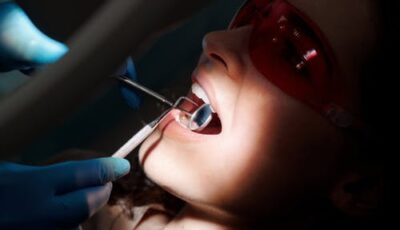
Dental anxiety is a widespread issue that affects many individuals at various stages of life. It’s that jittery feeling that creeps up before an appointment, often leading to stress or even avoidance of necessary dental care. Whether it’s the unfamiliar environment, the fear of pain, or a previous bad experience, these concerns are valid and should be addressed with care.
Luckily, there are effective strategies for tackling these fears, making dental visits a less daunting experience. This article aims to provide practical insights and step-by-step tips to ease dental anxiety and ensure a smoother journey to good oral health.
Strategies to Ease Dental Anxiety
Conquering dental anxiety involves adopting a variety of methods tailored to individual needs. Here are some useful strategies to consider:
-
Open Communication: Discuss any fears or concerns with the dentist to build trust and receive personalized care.
-
Relaxation Practices: Employ techniques such as deep breathing or meditation to alleviate stress.
-
Support System: Bringing a trusted friend or family member can provide emotional support.
-
Utilize Distractions: Listening to music or podcasts during the appointment can help focus the mind elsewhere.
-
Consider Sedation: For severe anxiety, discuss potential sedation options with the dental provider.
Open Communication with the Dental Team
Engaging in candid conversations with dental professionals about anxiety can significantly enhance the experience. Dentists and their staff are trained to accommodate and soothe anxious patients. By expressing concerns, patients enable the dentist to modify their approach, whether by explaining procedures or allowing short breaks. This transparency fosters a supportive atmosphere, encouraging individuals to feel more at ease during dental visits.
Practical Relaxation Techniques
Integrating relaxation methods such as deep breathing exercises can markedly reduce anxiety levels. By focusing on slow inhalation through the nose and gradual exhalation through the mouth, it becomes possible to experience a calming effect. Meditation and guided imagery offer alternative relaxation avenues, aiming to replace anxiety with peaceful and positive thoughts. These techniques are simple to execute and beneficial in alleviating stress both before and during dental procedures.
The Benefit of Having a Support System
Having the support of a friend or family member during a dental appointment can act as a solid pillar of comfort. This companion’s presence offers reassurance and helps lessen anxiety by providing a familiar focal point. Whether they accompany the individual to the waiting area or sit beside them during the session, their mere presence is often enough to ease tension. It’s advisable to check with the dentist’s office about policies to ensure a companion is allowed during the appointment.
Making the Most of Distractions
Distractions serve as a viable method for managing dental anxiety. Bringing along an engaging audiobook, a favorite music playlist, or an interesting podcast can effectively divert attention away from the procedure. This strategy enables individuals to immerse themselves in familiar sounds and minimize awareness of dental tools in use. Many dental practices now offer amenities such as TVs and noise-canceling headphones, so it’s worthwhile to inquire about these comforts to aid relaxation.
Exploring Sedation for Severe Anxiety
For individuals with severe anxiety, discussing sedation options with the dentist could provide a viable solution. Various levels of sedation exist, ranging from mild sedation with nitrous oxide (also known as laughing gas) to moderate levels with oral sedatives and deeper sedation through IV administration. These options cater to different levels of anxiety and are monitored closely by professionals. Sedation dentistry is considered safe and often leads to a more pleasant experience for anxious patients.
Preparing for the Dental Appointment
Taking time to prepare for a dental visit can greatly mitigate anxiety. Understanding the procedure, confirming insurance details, and organizing transportation arrangements are all useful pre-appointment steps. Scheduling appointments at times when the person typically feels more relaxed, such as mornings, can further decrease stress levels. Limiting caffeine and opting for a light meal before the visit help prevent agitation, thus encouraging a calm state of mind. Bringing along any necessary paperwork can streamline the check-in process.
-
Know the Procedure: Gain knowledge about the planned dental work to alleviate fears.
-
Transportation Plans: Arrange for a ride if sedation is involved or if anxiety is overwhelming.
-
Timing is Key: Choose an appointment time when feeling less stressed, like in the morning.
-
Caffeine and Diet: Avoid stimulants and eat a light, nourishing meal.
-
Documentation Ready: Have any required paperwork and insurance details in order.
Seeking Local Supportive Environments
Exploring specialized options in one’s local area can uncover dental services in Phoenix tailored to comfort and anxiety reduction. For example, these services may offer patient-friendly environments or practices that specialize in treating nervous patients. Many clinics have staff trained in handling anxious visitors and provide amenities designed to relax both the mind and body. Choosing a supportive and understanding practice can create a vastly more pleasant dental experience, so research local options for optimal care.
Professional Guidance for Overcoming Anxiety
When dental anxiety feels insurmountable, seeking guidance from a mental health professional may be beneficial. Therapists specializing in anxiety disorders can offer coping strategies and tailored interventions to ease dental fear. Cognitive-behavioral therapy (CBT) is one effective method that can reshape negative thought patterns associated with dental care. Additionally, exploring gentle dental options can make a significant difference. For example, procedures involving dental crowns Phoenix are often designed with patient comfort in mind, offering a less stressful experience for those with dental anxiety. These resources offer crucial support for maintaining regular oral health care.
Gradual Acclimatization to Dental Settings
Gradually familiarizing oneself with the dental office environment plays a role in reducing anxiety. Scheduling introductory visits to simply meet the dentist and staff can establish rapport and diminish fears for future appointments. Building a comfortable relationship with the dental team and making regular check-ups part of the routine aid in developing a sense of familiarity.
In situations where immediate dental care is necessary, identifying options such as this emergency dentist ensures that professional guidance is available at a moment’s notice. Access to emergency care can provide peace of mind by ensuring that experts are ready to help when critical situations arise.
Connecting with Others Who Share Similar Concerns
Discussing dental anxiety with friends, family, or peer groups fosters a valuable support network. Sharing concerns and solutions with others who understand the struggle can offer reassurance and practical advice. Online platforms and forums dedicated to dental anxiety provide an additional outlet for connection, where individuals can exchange experiences and strategies. Engaging with a community of peers can lead to new insights and establish a welcoming space to discuss these worries openly.
Closing Remarks
Dental anxiety may be a common obstacle, but it’s one that can be overcome with the right approach and resources. By implementing these strategies and seeking supportive environments and professional guidance, dental visits can become manageable and even comfortable. Facing these fears prevents anxiety from compromising oral health care. With a combination of communication, preparation, and supportive networks, individuals can look forward to a more stress-free dental experience, nurturing both oral health and overall well-being.






